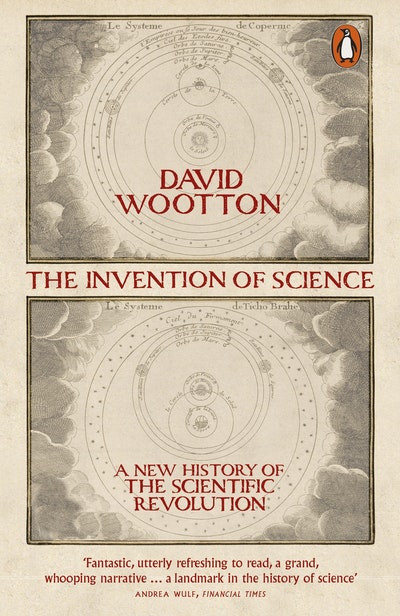The Invention of Science
A New History of the Scientific Revolution
- Published: 17 September 2015
- ISBN: 9780141916774
- Imprint: Penguin eBooks
- Format: EBook
- Pages: 784
The seventeenth century saw the emergence of the mindset that characterizes modern science. David Wootton lucidly describes the individuals, the experiments and the controversies that marked this intellectually turbulent and transformative era. He offers perceptive and novel insights into the nature of science, what distinguishes it from other modes of thought, and why it has been so successful. This fascinating and scholarly book should receive a wide readership.
Martin Rees, Astronomer Royal, President of the Royal Society 2005-10
This is a superb book, at once cogent, revisionist and profound. It offers the most novel and significant account of the Scientific Revolution to appear for many years. Wootton's style is clear and trenchant, and he has a real gift for giving lucid explanations of complex concepts and issues. At its best it is simply rather brilliant.
Michael Hunter, Professor of History at Birkbeck, University of London
David Wootton's The Invention of Science is a truly remarkable piece of scholarship. His work has an ingenious and innovative linguistic foundation, examining the invention and redefinition of words as tracers of a new understanding of nature and how to approach it. His erudition is awesome, and his argument is convincing.
Owen Gingerich, Professor Emeritus of Astronomy and of the History of Science at Harvard University
It is almost impossible to overstate the significance of the scientific revolution. As David Wootton's masterly The Invention of Science shows, it was nothing less than the triumph of the future over the past. Before it, Aristotle had been the leading authority on nature and philosophers had sought above all to recover the lost culture of the ancients. Afterwards, the idea that new knowledge was possible had become axiomatic. ... The concept of discovery transformed the world, says Wootton. Hitherto, philosophers had believed that the greatest achievements of civilisation were in the past - in ancient Greece and Rome - and that these were the most fruitful subjects of human inquiry. Now, this backward-looking impulse in western thinking was replaced with a new emphasis on "experience". "Experience as the path to discovery," Wootton says, "was scarcely recognised before the discovery of America". ... a fantastic revisionist history, an intellectual feat and a marvellous attack on those academics who believe that "retrospective history" - written with the outcome in mind - is wrong. It's utterly refreshing to read a grand, whooping narrative that is also exhaustively researched. It will, I am certain, become a landmark in the discipline of the history of science.
Andrea Wulf, Financial Times
Sexual intercourse, proclaimed Philip Larkin, began in 1963; this magisterial and magnificent book affords similar significance to the night of 11/12 October 1492. That was when Christopher Columbus, or more probably his lookout Rodrigo de Triana, first saw the New World. This discovery would initiate a revolutionary chain of events, David Wootton argues: the invention of science had begun. ... Wootton's book tells, in gripping and convincing detail, how these big changes happened. From Columbus he traces a story whose major actors include Nicolaus Copernicus, Tycho Brahe, Galileo Galilei, Johannes Kepler, Evangelista Torricelli, William Gilbert, René Descartes, Isaac Newton and Blaise Pascal. It ends with the scientific method, as we know it today, firmly established, and with the invention in 1712 of the steam engine, "the first, great practical achievement of the new science", by Thomas Newcomen. ... I initially thought to compliment Wootton by saying that he writes like a scientist, and indeed in many ways he does. His assembly and interpretation of evidence is painstaking and convincing ... he always gives a clear sense of how his arguments lead from A to B to C. Yet he also does so much more. Because he is not shackled by the conventions of scientific writing, he can afford to be entertaining, and he is: The Invention of Science is full of countless interesting asides. ... This is a multifaceted book to savour, to enjoy and to remember.
Richard Joyner, Times Educational Supplement


